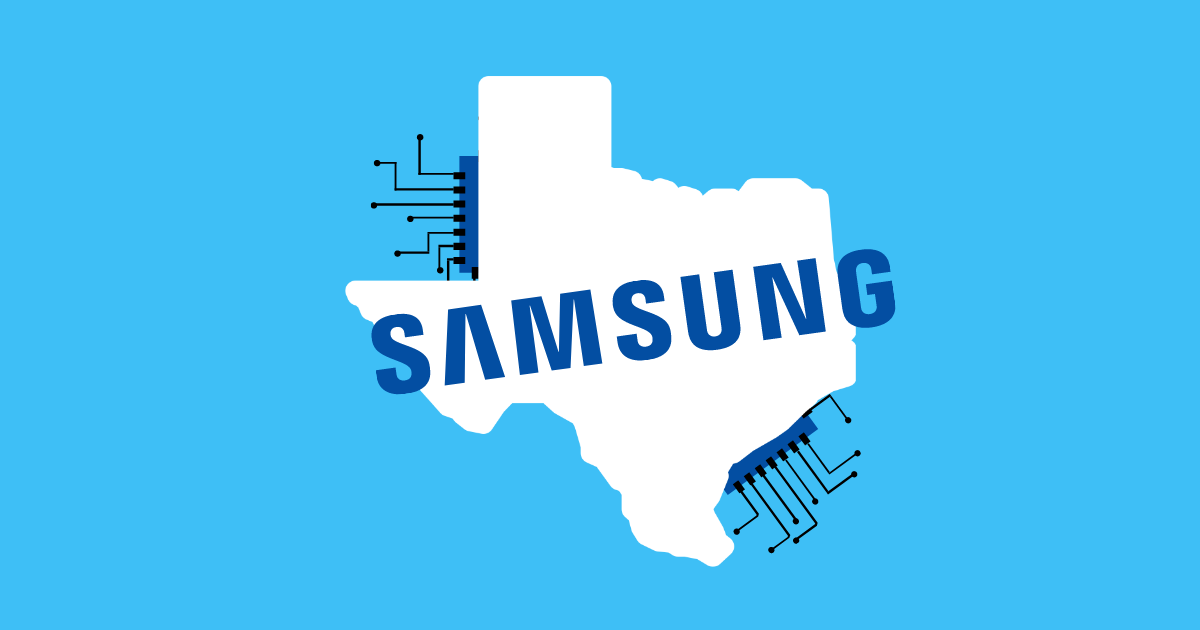On Wednesday, the Taylor City Council and Williamson County approved incentives to lure a $17 billion Samsung chip factory to Taylor. This comes amid a global chip shortage that has left nations scrambling to secure their supply chains.
Under the planned agreement, the South Korean tech giant will construct a six million square foot facility and provide at least 1,800 full-time jobs. If these conditions are met, Samsung will be granted 90 percent of ad valorem taxes paid for the first decade of the agreement, and 85 percent for the second decade. While Samsung has not made an official announcement, it has reportedly already picked Taylor after also considering Austin, upstate New York and Arizona.
“This agreement is a win for Williamson County because it is performance based. Williamson County first collects all taxes on the assessed value of the company and does not grant back any funds until performance measures have been met,” said Precinct 4 Commissioner Russ Boles. “This allows us to be competitive in recruiting large companies, such as Samsung, while holding them accountable to their promises for the jobs and improvements they will bring.”
While the resolution passed unanimously amongst both the city council and county commissioners court, some locals were concerned about road maintenance in light of the tax breaks. Nevertheless, the promise of jobs and educational opportunities was enough to create strong support for the deal.
In addition to the economic benefits for Taylor, local officials cited national security concerns and the chip shortage. Chips, also known as semiconductors, are a strategic commodity that’s as crucial to modern civilization as oil if not more important. Everything from video game consoles to fighter jets require chips. With the rise of technologies like artificial intelligence and the Internet of Things, the demand for chips is only expected to grow in the coming years.
The chip industry is currently dominated by Taiwan, with Taiwan Semiconductor Manufacturing Company (TSMC) producing about 50 percent of all chips in the world and also making the most advanced chips. While TSMC has some fabs overseas, 80 percent of its capacity is in Taiwan.
For decades, the world was satisfied with this arrangement. Chipmaking requires a complex and expensive industrial ecosystem and Taiwan was willing to invest substantial time and money into developing this ecosystem while the rest of the world was happy to outsource the job to them. Many companies went “fabless,” designing and selling chips but outsourcing their manufacture.
Recent events have made the world uncomfortable with its dependence on Taiwan. First, the current shortage has demonstrated just how serious the vulnerability is. The pandemic disrupted supply while also increasing demand for things like cloud computing. Poor planning, particularly by the auto industry, also played a role (chip orders are made well in advance and many manufacturers reduced their orders too much after severely underestimating how resilient demand would be). The result was skyrocketing prices for products like cars.
While TSMC is expanding capacity to address the shortage, geopolitics are making countries increasingly nervous about relying on Taiwan for chips. The Chinese Communist Party considers Taiwan to be part of China, not an independent nation. Beijing reserves the right to bring the island back into the fold by force, and China’s rapidly modernizing military and increasingly belligerent behavior have stoked fears that they will attempt to do so in the near future. This in turn has fuelled concerns about the global economy’s dependence on a country that could become a war zone.
Numerous countries, including the United States, are now trying to reduce their dependence on foreign chips. In June, the Senate passed the U.S. Innovation and Competition Act, which included $52 billion for domestic chip production. Even TSMC is assisting the United States’ efforts to become more self-sufficient by building a chip factory in Arizona. Meanwhile, Samsung is betting big on its plan to eventually overtake TSMC.
This is where Taylor fits into the picture. A new chip factory in the United States would allow Samsung to expand capacity while also currying favor with Washington. While Samsung already has a foundry in Austin, it does not make cutting edge chips. The Taylor facility will incorporate the “most advanced technology in the semiconductor industry” according to the Williamson County resolution, and there’s speculation that it will be a 3 nm fab. 3 nm process is the next generation in chip design, meaning Taylor could end up being home to the most advanced chip factory in the United States. Right now TSMC’s Arizona facility will only be capable of making 5 nm, although TSMC is reportedly considering making 3 nm or even 2 nm foundries in the state at some point.
The great chip race is on, both between Samsung and TSMC in the business world and between the United States and China in the geopolitical arena. This could end up being one of the most crucial global competitions of our time.
William serves as the Washington Correspondent for the Texas Signal, where he primarily writes about Congress and other federal issues that affect Texas. A graduate of Colorado College, William has worked on Democratic campaigns in Texas, Colorado, and North Carolina. He is an internet meme expert.





